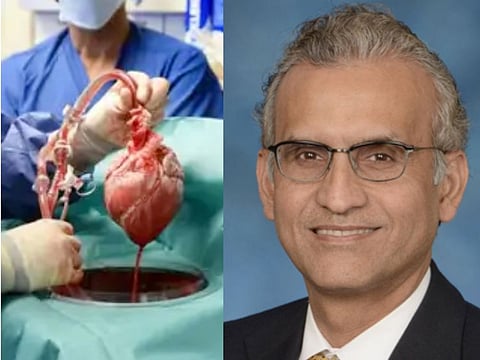Meet the Pakistani-American doctor pioneering pig-heart-to-human transplant
Muhammad Mohiuddin is a US-based surgeon-scientist behind 'xenografting' revolution

Muhammad M. Mohiuddin, a Pakistani-American scientist-surgeon, is one of the world’s foremost experts on transplanting animal organs, a new technique known as “xenotransplantation” — or “xenografting”.
He's one of the leading medical experts in the news lately for developing ways to transplant a pig heart to a human in a historical breakthrough likened to the Moon landing.
The recipient, 57-year-old David Bennett with known life-threatening heart disease, agreed to be the first to risk the experimental surgery. The heart from a genetically-modified (GM) pig was grafted into Bennett in the first successful transplant of its kind announced on Tuesday (January 11, 2022).
Bennett was "coping well", and the medical team said the GM heart “looks normal”. The operation is considered a breakthrough, though doctors said they are unsure how many hours, days, or years Bennett would survive with the genetically-modified heart.
'Game-changer'
Dr Mohiuddin works as a professor of surgery at the University of Maryland School of Medicine, in Baltimore. In an interview published by the university January 11, 2022, he said: “It is a game-changer. Because now, we will have these organs readily available. If this works, and I hope it will work, we’ll have these organs available.”
The world faces an acute shortage of organs — in the US, approximately 41,354 people received a transplanted organ in 2021 alone. Many die waiting for donors.
Dr Mohiuddin established the Cardiac Xenotransplantation Programme with Bartley Griffith, who performed the world’s first pig’s-heart-to-human transplant announced on Tuesday (January 11, 2022.)
Surgeon-scientist
He has extensive grounding in medical research specifically on xenografting, and collaborated with top scientists and surgeons.
In 2007, he published in the journal PLOS a study titled “Clinical xenotransplantation of organs: why aren't we there yet?”
In 2014, he led research on genetically-engineered pigs, specifically in how target-specific immunomodulation provides significant graft survival and hope for clinical cardiac xenotransplantation, published in the Journal of Thoracic and Cardiovascular Surgery.
In 2016, Dr Mohiuddin led scientific investigation into antibody therapy studies critical for long-term survival of pig-to-primate cardiac xenograft in a research published in Nature Communications.
Dr M Mohiuddin he completed his MBBS (MD) degree in Medicine, at the Dow Medical College, in Karachi, Pakistan in 1989.
‘Life-saving technique’
Going forward, the possibility of using animal organs for xenografting to meet the demand has long been considered — and using pig heart valves is already common.
In October 2021, surgeons in New York announced that they had successfully transplanted a pig's kidney into a person.
Mohiuddin said: “There are hundreds and thousands of people all around the world who are waiting for an organ. And unfortunately, just like this patient, they may not qualify for an organ transplant. If xenografts become readily available, and are allowed to be put in to these patients, all these patients could receive a heart, or any other organ from these modified pigs, and be able to save their lives.”
Sign up for the Daily Briefing
Get the latest news and updates straight to your inbox


